
Mortal Kombat Annihilation is a 1997 American martial arts fantasy film directed by John R. Leonetti in his directorial debut. Based on the Mortal Kombat video game franchise, it is the second installment in the Mortal Kombat film series and a sequel to the original 1995 film, on which Leonetti served as cinematographer. Largely adapted from the 1995 video game Mortal Kombat 3, Annihilation follows Liu Kang and his allies as they attempt to prevent the malevolent Shao Kahn from conquering Earthrealm. It stars Robin Shou as Liu, Talisa Soto as Kitana, James Remar as Rayden, Sandra Hess as Sonya Blade, Lynn Red Williams as Jax and Brian Thompson as Kahn. Only Shou and Soto reprise their roles, with the other characters recast from the previous film.
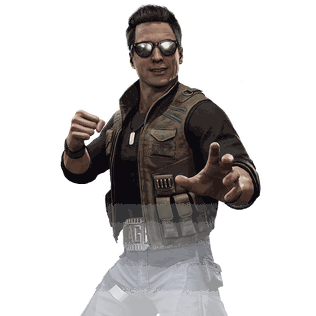
Johnny Cage is a character in the Mortal Kombat fighting game franchise by Midway Games and NetherRealm Studios. Introduced in the original 1992 game, he is an action movie star with an extensive martial arts background. The series depicts Cage as one of the primary heroes defending Earthrealm from various threats, as well as the comic foil. In the rebooted timeline, Cage is also the love interest to Special Forces officer Sonya Blade and the father of their daughter Cassie. He is inspired by martial arts star Jean-Claude Van Damme, particularly Van Damme's character, Frank Dux, in the 1988 film Bloodsport.
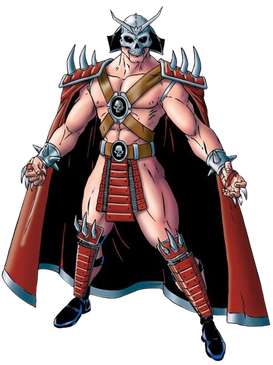
Shao Kahn is a fictional character in the Mortal Kombat fighting game franchise by Midway Games and NetherRealm Studios. Depicted as emperor of the fictional realm Outworld, he is one of the franchise's primary villains. Feared for his immense strength, which he complements with a large hammer, and knowledge of black magic, Shao Kahn seeks conquest of all the realms, including Earth. He serves as the main antagonist final boss of Mortal Kombat II (1993), Mortal Kombat 3 (1995) and its updates, and the 2011 reboot, as well as the action-adventure spin-off Mortal Kombat: Shaolin Monks (2005). An amalgam of Shao Kahn and DC Comics villain Darkseid also appears as the main antagonist and final boss of Mortal Kombat vs. DC Universe (2009) under the name Dark Kahn where as a younger persona known as "General Shao" appears in Mortal Kombat 1.
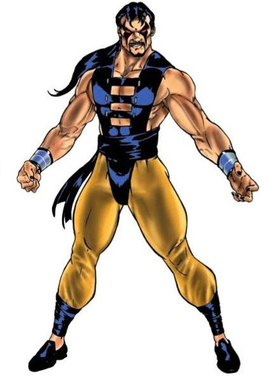
Shang Tsung is a fictional character in the Mortal Kombat fighting game franchise by Midway Games and NetherRealm Studios. He debuted as the final boss in the original 1992 game and has remained one of the franchise's primary villains. A powerful sorcerer, he is principally defined by his abilities to shapeshift into other characters and to absorb the souls of defeated warriors. Shang Tsung is usually portrayed as the right-hand man of Outworld emperor Shao Kahn and the archenemy of Shaolin monk Liu Kang. He also appeared as the main villain of Mortal Kombat: Deadly Alliance (2002), alongside Quan Chi as the eponymous Deadly Alliance, as well as in Mortal Kombat 11: Aftermath (2020) and Mortal Kombat 1 (2023).

Mileena is a fictional character in the Mortal Kombat fighting game franchise by Midway Games and NetherRealm Studios. Introduced in Mortal Kombat II (1993), Mileena was initially depicted as a clone of the Edenian princess Kitana, created by Shang Tsung with the blood of the fictional Tarkatan species, and raised alongside her "sister". Following the time-travelling actions of Raiden in Mortal Kombat 9 (2011), Mileena's background as a Tarkatan clone of Kitana remains the same, although she was only recently awoken, rather than raised alongside Kitana. Mortal Kombat X (2015) depicts her attempts to regain her throne as Empress of Outworld, following her overthrow by Kotal Kahn.

This is a list of playable and boss characters from the Mortal Kombat fighting game franchise and the games in which they appear. Created by Ed Boon and John Tobias, the series depicts conflicts between various realms. Most characters fight on behalf of their realm, with the primary heroes defending Earthrealm against conquering villains from Outworld and the Netherrealm. Early installments feature the characters participating in the eponymous Mortal Kombat tournament to decide their realm's fate. In later installments, Earthrealm is often invaded by force.

Kitana is a fictional character in the Mortal Kombat fighting game franchise by Midway Games and NetherRealm Studios. Debuting in Mortal Kombat II (1993), she is a royal from the fictional realm of Edenia. Her primary weapon is a pair of steel fans, which she uses for most of her special attacks.
Kung Lao is a fictional character in the Mortal Kombat fighting game franchise by Midway Games and NetherRealm Studios. A Shaolin monk, he debuted in Mortal Kombat II (1993). He is depicted as a primary hero in the series, including as one of the protagonists of the action-adventure spin-off Mortal Kombat: Shaolin Monks (2005). The character is also a descendant of the Great Kung Lao, the first Earthrealm champion of the Mortal Kombat tournament. His main weapon is a metal hat, which he uses for both melee and projectile attacks.

Mortal Kombat 3 is a 1995 arcade fighting game developed by Midway Games and first released into arcades in 1995. It is the third main installment in the Mortal Kombat franchise and a sequel to 1993's Mortal Kombat II. As in the previous games, it has a cast of characters that players choose from and guide through a series of battles against other opponents. The game avoids the tournament storyline of its predecessors, as various warriors instead fight against the returning Shao Kahn, who has resurrected his bride Sindel and started an invasion of Earthrealm.
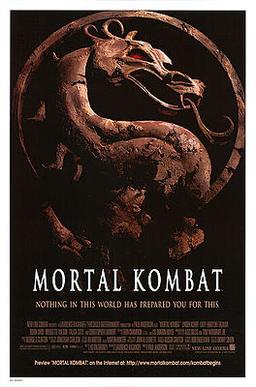
Mortal Kombat is a 1995 American fantasy action film directed by Paul W. S. Anderson and written by Kevin Droney. Based on the video game franchise of the same name, it is the first installment in the Mortal Kombat film series. Starring Linden Ashby, Cary-Hiroyuki Tagawa, Robin Shou, Bridgette Wilson, Talisa Soto, and Christopher Lambert, the film follows a group of heroes who participate in the eponymous Mortal Kombat tournament to protect Earth from being conquered by malevolent forces. Its story primarily adapts the original 1992 game, while also using elements from the game Mortal Kombat II (1993).

Reptile is a fictional character in the Mortal Kombat fighting game franchise by Midway Games and NetherRealm Studios. He debuted in the original 1992 game as a hidden opponent, establishing him as the first secret character in fighting game history. Reptile became playable in the follow-up Mortal Kombat II (1993) and has remained a mainstay of the franchise. As implied by his name, he is a Saurian, a fictional species of reptilian humanoids. One of the last surviving members of his race, he aligns himself with the series' primary villains in the hope his service will lead to the Saurians' revival.

Sonya Blade is a fictional character in the Mortal Kombat fighting game franchise by Midway Games and NetherRealm Studios. She debuted in the original 1992 game as the roster's sole female fighter, a military officer with the Special Forces.

Mortal Kombat: Shaolin Monks is a 2005 action-adventure beat 'em up video game developed and published by Midway for the PlayStation 2 and Xbox. A spin-off of the Mortal Kombat franchise, it is a retelling of the events of Mortal Kombat II (1993). Players control the eponymous Shaolin monks Liu Kang and Kung Lao in either single player or cooperative play as they protect Earthrealm from the forces of Outworld.

The Mortal Kombat comic books series included the official Mortal Kombat comics by Midway and a licensed adaptation series by Malibu Comics that was published in 1994-1995. There are thus two different lineups of Mortal Kombat comics: the tie-ins published by Midway and DC Comics that closely followed the storyline of the games, and the Malibu series, which took a few liberties with the source material.

Mortal Kombat: Live Tour was a martial art theatrical stage show featuring Mortal Kombat characters, sound, and laser light effects on stage. The plot was based on three fighters rescuing their friends and retrieving a magic amulet from the evil master of Outworld, Shao Kahn, in order to save the Earth.

Liu Kang is a character in the Mortal Kombat fighting game franchise by Midway Games and NetherRealm Studios. Depicted as Earthrealm's greatest warrior and champion, he is the protagonist of the series. He debuted in the original 1992 game as a Shaolin monk with special moves, which were intended to be the easiest for players to perform. Since his introduction, Liu Kang has appeared as playable in every main installment except Mortal Kombat: Deadly Alliance (2002). He is also one of the protagonists of the action-adventure spin-off Mortal Kombat: Shaolin Monks (2005).
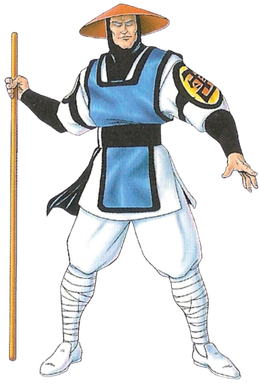
Raiden is a fictional character in the Mortal Kombat fighting game franchise by Midway Games and NetherRealm Studios. Based on the Japanese deity Raijin, he is depicted as the god of thunder who possesses control over lightning. He debuted in the original 1992 game and has appeared as a playable character in every main installment except Mortal Kombat 3 (1995) and its first update.

Mortal Kombat 11 is a 2019 fighting game developed by NetherRealm Studios and published by Warner Bros. Interactive Entertainment. It is the eleventh main installment in the Mortal Kombat series and a sequel to Mortal Kombat X (2015). The game was announced at The Game Awards 2018 and was released in North America and Europe on April 23, 2019, for Nintendo Switch, PlayStation 4, Windows, and Xbox One—with the exception of Europe's Switch version which was released on May 10, 2019. It was released on Stadia on November 19, 2019.

Mortal Kombat Legends: Scorpion's Revenge is a 2020 American direct-to-video adult animated martial arts film based on the Mortal Kombat franchise created by Ed Boon and John Tobias. South Korean studio Mir animated the film and was produced by Warner Bros. Animation. It is the first installment in the Legends series. Borrowing source material from Mortal Kombat, the film contains two plots: one dealing with Scorpion seeking his revenge on those who murdered his family and clan after being resurrected by Quan Chi, the other follows Johnny Cage, Liu Kang and Sonya Blade, who are chosen to participate on the Mortal Kombat tournament for the fate of Earthrealm.

Mortal Kombat Legends: Battle of the Realms is a 2021 American direct-to-video adult animated martial arts film, directed by Ethan Spaulding from a screenplay by Jeremy Adams, based on the Mortal Kombat franchise created by Ed Boon and John Tobias, it is the second installment in the Legends series and a direct sequel to Mortal Kombat Legends: Scorpion's Revenge (2020). Produced by Warner Bros. Animation and animated by Studio Mir, Boon returned from the predecessor as creative consultant.

















